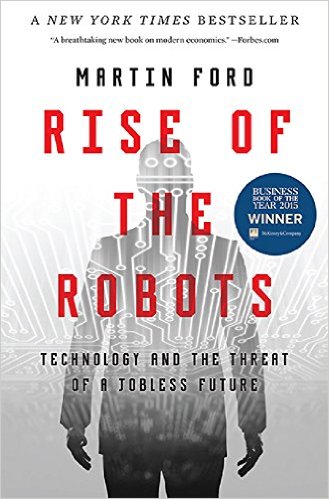Rise Of The Robots, Technology and the Threat of a Jobless Future
If you’re working for a living, get ready to not be. The robots are coming and are rapidly replacing everyone from burger flippers to corporate leaders. Whatever your job, robots can do it better and faster and never complain, get sick, form unions, or quit. Other than the initial purchase price for the robot, maintenance expense, and the cost of electricity to power them, they cost nothing. No retirement funds, health care benefits, Christmas bonuses, or overtime expenses required. They never leave the building and work 24/7.
Sound scary? Get a grip on the concept, because in 20 years this book predicts that robots will dominate the workforce. Even those phone service representatives in India will be replaced with voice recognition software that speaks better than you do and can answer any question, in any language, in milliseconds. All this scariness is due to the rise of computerized artificial intelligence that will design better robots, and the programs to operate them. The end result will be incredibly intelligent workers who are faster, cheaper, and more operationally flexible than any human can ever hope to be.
Even the programmers who are currently creating these lifeless marvels will soon be replaced with AI that will create programming faster and better than any human can, and never stop improving the sophistication of the program. Improving the “breed” will never stop, and accelerate exponentially. In a very short time robots will intellectually leave us humans behind. Where it stops, nobody knows, perhaps not even the robots as their intelligence and capabilities spiral out of our control and into the future.
So where does that leave you and me? Do we become the equivalent of house pets, taken to a robot hospital for our yearly check-up, even if we don’t want to go? The prospects are intriguing. The one thing robots currently can’t do is make consumer decisions about buying stuff. Until robots develop a liking for eating, drinking, driving fast cars (oops, too late for that one), and pursuing the opposite sex, humans will be tasked with being full-time consumers. Someone has to go shopping to purchase all the goods and services that the robots produce! A world where your every wish is fulfilled is just around the corner. Money? Who needs it when all you need is desire. Get that new hat, travel anywhere you want, lie on the beach and have the robot cabana-boy bring you the drink of your choice. It’s all possible, and it’s going to happen sooner than you think.
The author isn’t just any talking head, he’s the founder of a software development company and has a quarter century of work experience in this field. This background has put him in an excellent position to see the future trends of software development. He has written a previous book, The Lights in the Tunnel: Automation, Accelerating Technology, and the Economy of the Future that dealt with this same general topic. His current book, however, may be his last one because, well, robots can do that too. In fact, they are doing it already: a high percentage of news articles are written by such computer programs as “Quill” and “StatsMonkey”. In ten years it is expected that 90% of all sports, business and political news stories will be written by non-humans because it’s cheaper, faster, and more accurate. If Ford continues to wield the pen, will there come a time when he won’t be able to write intelligently about it because it’ll be beyond his ability to comprehend?
The book concludes with an “all’s well that ends well” chapter that points out the basic need for cash flow and consumption to keep the factories humming and profits flowing into the bank accounts of the corporations switching over to automated manufacturing.
Toward the end of the book, Ford outlines various ideas for making the transition from humans making money and spending it, to robots making money and humans spending it. Basically, he extrapolates what the US government is currently doing socially in the way of benefits for the public, and extends that process until citizens are paid not to work, only to consume. The consumption would keep the factories running and return profits to the privately held companies, or corporate shareholders, should profits matter to robot-run companies. The unstated fear here is that if humans don’t work, the world will go to hell in a handcart as sloth and decadence come to rule the land. Either that, or the robots will kill us all because we’re in their way somehow, prior to their launching off into space to conquer the universe.
Personally, I don’t expect to see a future composed of either of those extremes. As has been shown in academic studies of permanently laid-off-at-full-pay San Francisco Longshoremen in the 1950s, and other prematurely “retired” groups of humans, work is as much a psychological need as a chore. We instinctively want to be doing something. Even the mega-rich like to be active. Because of that basic desire, I expect the future to be full of artisans, in groups or singly, building/writing/painting/creating one-of-a-kind objects or endeavors for their own personal amusement. A golden age of psychological self-fulfillment could result. Well . . . here’s hoping.
This well-written and easy to read book opens with an Introduction, followed by 10 chapters covering topics like: “White-Collar Jobs at Risk,” “Technologies and Industries of the Future,” “Super-Intelligence and the Singularity,” and “Toward a New Economic Paradigm.” A Conclusion closes things out, then Acknowledgments, Notes, and an Index.
Won the 2015 FT & McKinsey Business Book of the Year Award.
For a public radio interview with the author, go to: <http://www.prx.org/pieces/161644>.
Copyright 2016, Bill Ingalls (SpeedReaders.info).



 RSS Feed - Comments
RSS Feed - Comments






































































 Phone / Mail / Email
Phone / Mail / Email RSS Feed
RSS Feed Facebook
Facebook Twitter
Twitter